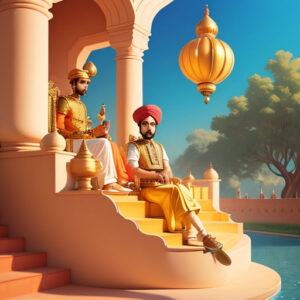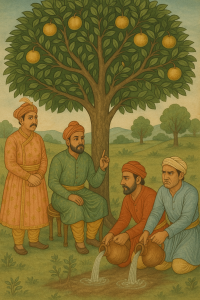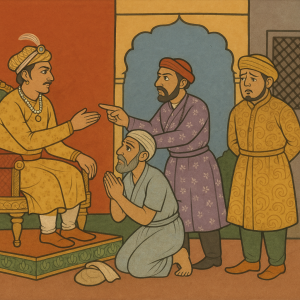Introduction: The Fame of Surdas
Surdas, the blind poet-saint, became renowned throughout India for his deep devotion to Lord Krishna and his ability to express that devotion through beautiful songs and poetry. His fame spread quickly, even reaching the court of Emperor Akbar in Delhi, the capital of much of India at the time.
Tansen Introduces Surdas to Akbar
In Akbar’s court, there was a legendary musician named Tansen, who was a devotee of Krishna despite serving in the court of a Muslim emperor. One day, Tansen sang a song composed by Surdas before Akbar. The song was so moving that it brought tears to the emperor’s eyes. Akbar, deeply touched, praised Tansen and offered to reward him for composing such a beautiful piece. Tansen, however, humbly replied, “I didn’t write this song; Surdas did.”
Akbar’s Request for Surdas
Intrigued by Surdas, Akbar asked, “Who is Surdas?” Tansen explained that Surdas was a saint who lived in Vrindavan. Akbar, being somewhat materialistic, thought that if Surdas could write such beautiful songs about God, he could also write some flattering songs about him, the emperor. So, he ordered Tansen to bring Surdas to his court.
Surdas’ Refusal to Glorify the Emperor
When Surdas arrived in Akbar’s court, the emperor quickly requested him to compose a song about his glories. Akbar, full of pride, said, “You must have heard of me; I am the emperor, and everyone loves me. Everyone gives their heart to me.”
But to Akbar’s astonishment, Surdas refused. “No,” he said. The emperor, taken aback, demanded an explanation. Tears welled up in Surdas’s eyes as he softly said, “I have given my heart to Krishna, and there is no room inside for anyone else. Sorry. I have given my heart to Krishna, and there is no room inside for anyone else.”
Surdas’ Spontaneous Devotion
At that moment, Surdas, overwhelmed with love for Krishna, spontaneously composed and sang a new song about Krishna right there in front of the emperor. The room, which moments before was filled with the grandeur of the emperor’s court, now resonated with the pure devotion of Surdas. His voice, filled with love, echoed through the hall.
The Song of Pure Devotion
The song he sang was a heartfelt expression of his undivided love for Krishna:
“I know no one other than my cowherd protector, Gopala. How can I throw away this priceless diamond to collect glass beads instead? If you have a tiny drop of immortalizing amrita, a mountain of poison can have no effect. To my heart, to my words, and to my body, no one else is as attractive as my Gopala. My Gopala, my Shyam, has brought me enormous riches. For my lord, I have given up everything, even my caste. So says Surdas.”
The Court’s Reaction
When Surdas finished singing, the entire court, including Akbar, was speechless. The emperor, who moments before sought flattery, was left in awe of the pure and unshakeable devotion Surdas had for Krishna. The depth of Surdas’s devotion had pierced the hearts of everyone present, leaving them deeply moved and unable to speak.
Tansen’s Famous Remark
After a few moments of silence, Tansen, the main court musician, stood up and spoke a famous line that captured the essence of what had just happened:
“Some are hurt by a warrior’s arrow. Some are tortured by pain. But those whose hearts are touched by Sura’s lyrics are pierced through again and again and again.”
Conclusion: The Power of Bhakti
Surdas’s songs were composed in the local Brajbhasha language, which resonated deeply with the people of Braj, who were themselves ardent lovers of Krishna. He became beloved not only for his devotion but also for his poetic genius and musical skill. The acharyas say that Surdas knew how to churn the hearts of people with these three things: his devotion, his poetic genius, and his musical abilities. His story demonstrates the transformative power of bhakti, the ability to captivate and move even the most powerful of emperors with the pure love of God.


